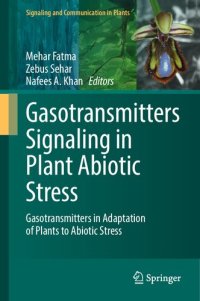
Ebook: Gasotransmitters Signaling in Plant Abiotic Stress: Gasotransmitters in Adaptation of Plants to Abiotic Stress
- Genre: Biology // Plants: Botany
- Series: Signaling and Communication in Plants
- Year: 2023
- Publisher: Springer
- City: Cham
- Language: English
- pdf
This book deals with the gasotransmitters signaling in redox reactions and homeostasis for the adaptation of plants to unfavorable abiotic stress environments. There are lots of interesting chapters in this book that cover both research and educational objectives. This book serves as a reference illustrated book for all who are interested in the regulation of gasotransmitters and redox homeostasis in agriculture. Maintenance of redox homeostasis strengthens the potentiality of plants to resist abiotic stress conditions through the enhanced antioxidant system and the subsequent impact on other signaling molecules. The book presents novel outcomes and implications in plant biology concerning the study of different types of gasotransmitters signaling such as nitric oxide (NO), ethylene, hydrogen sulfide (H2S), etc. under diverse abiotic stresses in one place. The chapters of the book discuss the recent progress and current perspectives on the role of gasotransmitters relevance to plant functions and adaptations to abiotic stresses, the influence of gasotransmitters on the physiology of plants with respect to abiotic stress tolerance, gasotransmitters and omics for abiotic stress tolerance, advancement in the biology of gasotransmitters in regulating salinity and drought stress response in plants, new insights of gasotransmitters and cellular redox homeostasis in plants and the chapter also deliberate the emerging role of gasotransmitters in regulating redox homeostasis for plant stress management. This book is the first comprehensive book covering all aspects and advancements in the biology of gasotransmitters in redox homeostasis conferring different abiotic stress tolerance, from which readers from all backgrounds can get benefitted. This book will appeal to researchers, students, scientific societies, agriculturists, etc.